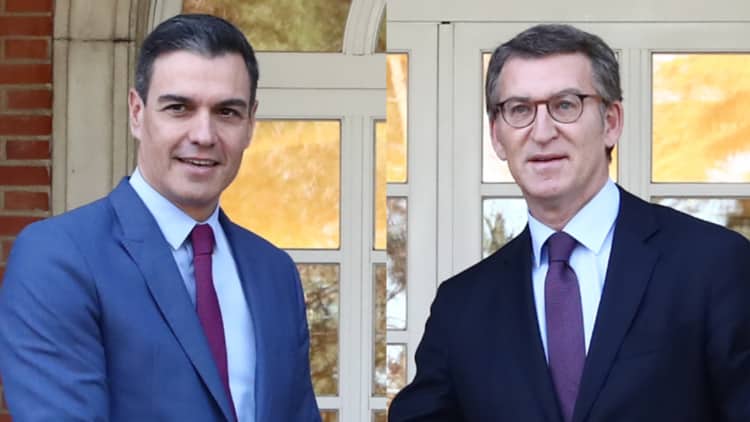Ángel Collado
Already in pre-campaign, Alberto Núñez Feijóo has reinforced his bid to occupy the entire political space of the centre right with signings or approaches to former ministers of his party who were in the teams of Mariano Rajoy and José María Aznar.
The PP president wants to concentrate the vote of the entire opposition to Pedro Sánchez to avoid future dependence on the extreme right (Vox) to form a government in the event of winning the next elections.
Feijóo’s moves to strengthen his alternative, to grow in the centre, contrast with the PSOE secretary general’s determination to shore up his left-wing front with Podemos, despite ongoing internal conflicts, and the pro-independence groups that complete his majority in power.
Sánchez has adopted the populist and anti-business discourse of his partners while at the same time promoting the electoral candidacy of his vice-president Yolanda Díaz to cover the most extreme political space, which his party’s acronym cannot reach. The minister, who comes from the Communist Party, provides him with a less harsh image and a less confrontational tone than the heirs of Pablo Iglesias and also members of Sanchez’s cabinet: Irene Montero and Ione Belarra.
Sánchez’s strategy to face the two elections (local in May and general in December) on the basis of his coalition in crisis, which he needs to shore up, and Feijóo’s offensive to widen the PP’s electoral base are at the heart of the spectacle of the unviable motion of censure against the government that brings Congress together today and tomorrow.
Vox, in need of prominence in the face of the advance of the PP in the most recent regional elections (Madrid and Andalusia) and the polls, provides Sánchez with a parliamentary showcase and the first unanimous vote without fights from all his partners and allies. Socialists, podemites, left-wing and right-wing independentists, regionalists and the heirs of the political arm of the ETA gang will once again unite as they have not done for months to vote ‘no’ to Ramón Tamames, the candidate proposed by Santiago Abascal to preside over the Executive.
Faced with the clamp of interests of the PSOE coalition government and the populists determined to remain in power with the same formula and the extreme right that is trying to stop its own regression, the PP will abstain in view of the absurdity of the appointment.
The candidate, a former communist and figure of the Transition, only wants to give a lecture against the government and the proposer (Abascal) seeks a “mano a mano” with Sánchez to play the role of head of the opposition for a day. By the way, the head of the censured Executive will take advantage of the debate to present himself as a dike against “the right”, which he describes as a whole as extreme, to attack Feijóo, and to continue with his basic Peronist-style campaign script by proclaiming himself the representative of “the people” as opposed to the interests of “the powerful”.
The PP has tried in recent weeks to turn the tacit Sánchez-Vox understanding for the revival of the extremes against its promoter. Feijóo, who is not a member of parliament and cannot participate in the debate, will not even be in the chamber.
The head of the opposition has distanced himself from the preparations for the motion by focusing in recent weeks on broadening his offer of an alternative to the current government, with the incorporation of political leaders with proven experience in government management. These are former ministers of the Popular Party with a more moderate image or a more centrist image, very much to the general taste in Spain until the emergence of populism and Pedro Sánchez’s motion of censure in 2018, which brought the left to power with the help of the pro-independence supporters.
Among the signings for his electoral campaign team and for the party’s foundation that will advise him on programmes, Feijóo is bringing back to his cause ministers, senior officials or leaders from the periods of Mariano Rajoy and José María Aznar that will allow him to strengthen his offer, especially in the economic area. These are the cases of Fátima Báñez, head of Employment during the seven years of the last PP cabinet, Íñigo de la Serna (Industry) and Román Escolano, Rajoy’s last Minister of Economy. Josep Piqué, who held the portfolios of Foreign Affairs and Industry under Aznar’s presidency of the Executive, also features in the list.
If Sánchez is betting on his coalition of the left, including populists, to remain in power, Feijóo is turning to the centre-right as a whole to avoid Vox in a future electoral map without clear majorities in government, pending the dictates of the ballot box.







